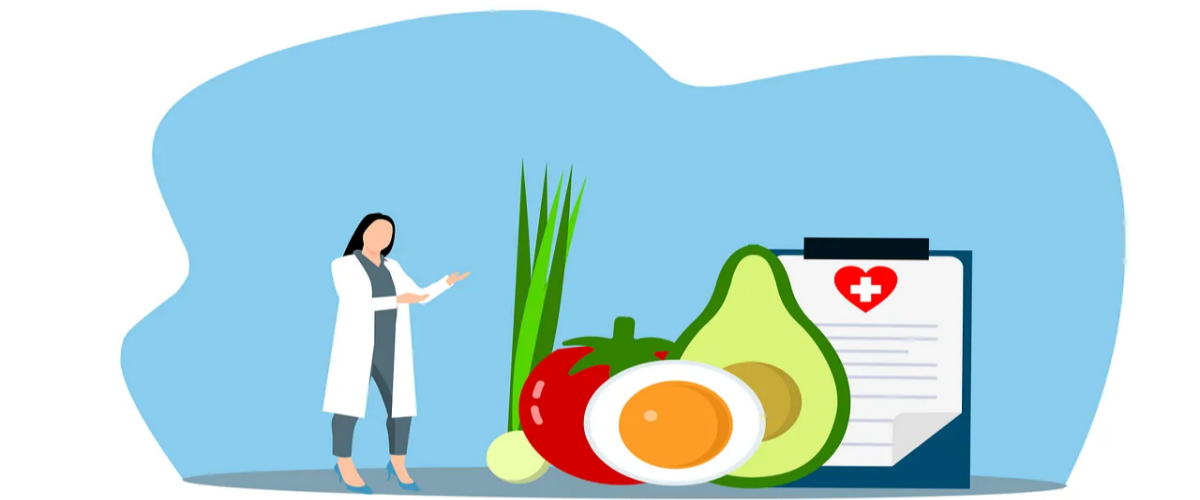Maintaining healthy cholesterol levels is essential for heart health and overall health. High cholesterol levels can lead to a variety of health problems, including heart disease and stroke. While medications can be prescribed to control cholesterol, simple lifestyle changes can also play an important role in lowering cholesterol naturally. Eating a healthy diet, engaging in regular physical activity, managing stress, getting enough sleep, and joining a dietary supplement plan are all important steps in maintaining healthy cholesterol levels. By making these small adjustments to your daily routine, you can improve your heart health and maintain your overall well-being.
Cholesterol is a waxy, fatty substance found naturally in every cell of our body. It is an important ingredient needed to produce hormones, vitamin D, and substances that aid digestion. Although cholesterol is necessary for our bodies to function properly, high cholesterol levels can be harmful to our health.
Our bodies produce cholesterol in the liver and intestines, and we also consume cholesterol through certain foods, such as meat, poultry, and full-fat dairy products. There are two types of cholesterol: high-density lipoprotein (HDL) cholesterol, often called "good" cholesterol, and low-density lipoprotein (LDL) cholesterol, often called "bad" cholesterol.
HDL cholesterol is considered "good" because it helps clear excess LDL cholesterol from the blood and transport it back to the liver, where it can be broken down and eliminated from the body. LDL cholesterol, on the other hand, can build up in arteries, forming plaque, clogging arteries and reducing blood flow. This increases the risk of heart disease, stroke, and other cardiovascular problems.
High blood cholesterol levels are a major risk factor for heart disease, the leading cause of death worldwide. Many factors can cause high cholesterol, including an unhealthy diet, lack of physical activity, smoking, obesity, and certain medical conditions, such as diabetes and hypothyroidism.
To determine your cholesterol levels, a blood test called a lipid profile or lipid panel is often performed. This test measures your total cholesterol, LDL cholesterol, HDL cholesterol, and triglycerides (another type of fat in your blood).
There are two main types of cholesterol: LDL and HDL
LDL cholesterol: LDL cholesterol stands for low-density lipoprotein and is known as "bad" cholesterol. This is because it can lead to the buildup of plaque, a combination of fat, cholesterol and calcium that can clog arteries and impede blood flow. When blood flow is blocked, you may have a heart attack or stroke.
HDL cholesterol: HDL cholesterol stands for high-density lipoprotein. It's called "good" cholesterol because HDL protects the heart. HDL's job is to transport a portion of LDL cholesterol from the heart to the liver, where it can be excreted from the body.
1. Dietary factors
Our diet plays an important role in determining cholesterol levels. Foods high in saturated fat and trans fat can lead to an increase in low-density lipoprotein (LDL) cholesterol, often called "bad" cholesterol. Eating excess amounts of red meat, high-fat dairy products, fried foods, processed snacks, and pastries can lead to a buildup of LDL cholesterol, which can clog arteries and impede blood flow.
2. Sedentary lifestyle
Lack of physical activity is another key factor in high cholesterol levels. Regular exercise helps increase high-density lipoprotein (HDL) cholesterol, often referred to as "good" cholesterol, which plays a vital role in transporting excess cholesterol from the blood to the liver for processing. Without enough physical activity, the balance between LDL and HDL cholesterol can be disrupted, causing cholesterol levels to rise.
3. Obesity and weight gain
Being overweight or obese is closely related to high cholesterol levels. Being overweight, especially around the abdomen, increases LDL cholesterol and triglyceride levels while lowering HDL cholesterol. Obesity affects the body's ability to properly metabolize and remove cholesterol from the blood, leading to the accumulation of cholesterol and the development of atherosclerosis.
4. Genetic factors
Some people have an inherent tendency to have higher cholesterol levels due to genetic disorders such as familial hypercholesterolemia. These conditions disrupt the body's ability to clear excess LDL cholesterol from the blood, causing persistently elevated cholesterol levels. Genetic factors account for only a small percentage of cases of high cholesterol, but they should not be ignored when assessing a person's risk factors.
5. Smoking and drinking
Smoking and excessive alcohol consumption can adversely affect cholesterol levels. Smoking lowers HDL cholesterol, making it less effective at removing LDL cholesterol from the blood. It also damages the lining of your arteries, making it easier for cholesterol to penetrate and form plaque. On the other hand, heavy drinking can raise levels of triglycerides, a type of fat in the blood that has been linked to elevated cholesterol.
1. Chest pain or angina: One of the significant symptoms of high cholesterol is chest pain or angina. When plaque builds up in the arteries, it can restrict blood flow to the heart muscle, causing chest pain or discomfort. This pain may radiate into the arms, shoulders, neck, jaw, or back and is often triggered by physical exertion or emotional stress. If you experience such symptoms, you must seek medical attention immediately.
2. Extreme fatigue and weakness: Feeling constantly tired or weak for no apparent reason may be a subtle sign of high cholesterol. When arteries become clogged with plaque buildup, it can restrict blood flow to the body, causing fatigue and weakness. These symptoms may often go unnoticed or be attributed to a busy lifestyle or lack of sleep. However, it's important to pay attention to these signs, as they may indicate underlying health problems, including high cholesterol.
3. Shortness of Breath: If you find yourself continually short of breath, even during light activity or at rest, it may be cause for concern. Plaque buildup in the arteries can affect blood circulation in the lungs, making it difficult to breathe. This symptom sometimes leads to misdiagnosis as a respiratory problem rather than being related to high cholesterol.
4. High blood pressure: High blood pressure, or high blood pressure, is often associated with high cholesterol levels. Plaque buildup in the arteries not only restricts blood flow, but it also puts extra stress on the heart, causing blood pressure to rise. While high blood pressure can have many causes, the possibility of high cholesterol as an underlying factor must be considered.
5.In rare cases, people with high cholesterol may develop soft, yellowish cholesterol deposits called xanthomas on their skin. These deposits appear primarily on and around the eyelids as flat, yellowish patches. Although painless, their presence should alert people to the possibility of potentially high cholesterol levels.

Maintaining healthy cholesterol levels is important for overall health, as elevated cholesterol levels can lead to an increased risk of heart disease and other cardiovascular complications. While adopting a healthy lifestyle, including regular exercise and a balanced diet, is the foundation of cholesterol control, certain dietary supplements can also provide a significant boost.
1. Omega-3 fatty acids
Omega-3 fatty acids, commonly found in fatty fish such as salmon, mackerel, and sardines, are known for their numerous health benefits. Incorporating these fatty acids into your diet through supplements or eating fish can help lower triglyceride levels and increase HDL (good) cholesterol levels. Omega-3 fatty acids also have anti-inflammatory properties that help prevent the formation of plaque in the arteries, further helping to improve cardiovascular health.
2. Garlic
Garlic has long been known for its many health benefits, including its potential to lower cholesterol levels. Allicin, the active compound in garlic, has been shown to reduce cholesterol production in the liver and inhibit the oxidation of LDL cholesterol. Adding raw or cooked garlic to your meals or taking a garlic extract supplement can improve your cholesterol profile, making it an easy and affordable addition to your cholesterol management plan.
OEA is a naturally occurring molecule in our body that acts as a signaling molecule for various physiological processes. It plays a crucial role in regulating energy balance, appetite, and lipid metabolism. OEA is primarily produced in our small intestines, but can also be found in other organs and tissues.
OEA can regulate the ability of cholesterol metabolism. Multiple studies have shown that OEA can affect cholesterol levels by affecting its synthesis, transport, and absorption in the body. Studies in animal models have shown that OEA administration reduces cholesterol levels, specifically LDL (low-density lipoprotein) cholesterol, the "bad" cholesterol.
OEA does this by activating certain nuclear receptors in the gut, including PPAR-alpha (peroxisome proliferator-activated receptor alpha). When PPAR-alpha is activated, it stimulates the breakdown of fatty acids, thereby reducing cholesterol production, especially in the liver. In addition, OEA can enhance the excretion of cholesterol in the body, further exerting its cholesterol-lowering effect.
In addition, OEA improves insulin sensitivity and regulates glucose metabolism, both of which are key factors in maintaining healthy cholesterol levels. By regulating these metabolic processes, OEA indirectly promotes a healthy lipid profile and reduces the risk of cholesterol-related complications.
Cholesterol is a fatty substance produced naturally by our bodies and also found in certain foods. It plays a vital role in body functions such as the production of hormones and cell membranes.
Research shows that PEA can inhibit cholesterol production in liver cells. By doing so, it may help lower overall cholesterol levels and reduce the risk of cardiovascular disease. The potential cholesterol-lowering effect of PEA is thought to be due to its ability to activate certain receptors that regulate cholesterol metabolism.
Additionally, PEA has been found to have anti-inflammatory properties. Inflammation plays a crucial role in the development of atherosclerosis, a disease in which cholesterol plaque builds up in the arteries, causing reduced blood flow and increasing the risk of heart disease. By reducing inflammation, PEA may help maintain healthy arteries and prevent cholesterol buildup.
Q: Do natural remedies or supplements effectively lower cholesterol?
A: Some natural remedies and supplements may have potential cholesterol-lowering effects, but their effectiveness varies. It is recommended to consult with a healthcare professional before starting any natural remedies or supplements to ensure their safety and effectiveness.
Q: How long does it take to see results from lifestyle changes to lower cholesterol naturally?
A: The timeline for seeing results from lifestyle changes varies from person to person. Generally, significant improvements in cholesterol levels may be observed within 3 to 6 months of making consistent healthy lifestyle changes.
Disclaimer: This article is for general information only and should not be construed as any medical advice. Some of the blog post information comes from the Internet and is not professional. This website is only responsible for sorting, formatting and editing articles. The purpose of conveying more information does not mean that you agree with its views or confirm the authenticity of its content. Always consult a health care professional before using any supplements or making changes to your health care regimen.
Post time: Nov-27-2023








